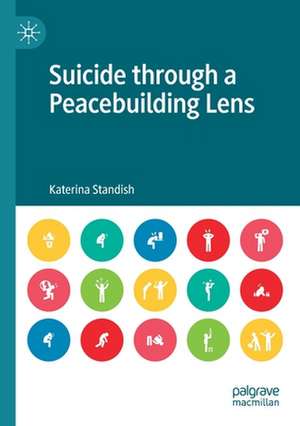Suicide through a Peacebuilding Lens
Autor Katerina Standishen Limba Engleză Paperback – 13 aug 2020
| Toate formatele și edițiile | Preț | Express |
|---|---|---|
| Paperback (1) | 454.92 lei 6-8 săpt. | |
| Springer Nature Singapore – 13 aug 2020 | 454.92 lei 6-8 săpt. | |
| Hardback (1) | 531.91 lei 6-8 săpt. | |
| Springer Nature Singapore – 12 aug 2019 | 531.91 lei 6-8 săpt. |
Preț: 454.92 lei
Nou
Puncte Express: 682
Preț estimativ în valută:
87.06€ • 94.53$ • 73.13£
87.06€ • 94.53$ • 73.13£
Carte tipărită la comandă
Livrare economică 22 aprilie-06 mai
Preluare comenzi: 021 569.72.76
Specificații
ISBN-13: 9789811397394
ISBN-10: 9811397392
Pagini: 292
Ilustrații: XXXI, 292 p. 41 illus., 25 illus. in color.
Dimensiuni: 148 x 210 mm
Greutate: 0.43 kg
Ediția:1st ed. 2020
Editura: Springer Nature Singapore
Colecția Palgrave Macmillan
Locul publicării:Singapore, Singapore
ISBN-10: 9811397392
Pagini: 292
Ilustrații: XXXI, 292 p. 41 illus., 25 illus. in color.
Dimensiuni: 148 x 210 mm
Greutate: 0.43 kg
Ediția:1st ed. 2020
Editura: Springer Nature Singapore
Colecția Palgrave Macmillan
Locul publicării:Singapore, Singapore
Cuprins
Chapter 1: The Suicide Gap.- Chapter 2: Understandings of Suicide.- Chapter 3: Why Peace and Conflict Studies?.- Chapter 4: Medical Suicide.- Chapter 5: Instrumental Suicide.- Chapter 6: Social, Cultural and Political violence.- Chapter 7: Intention, Motivation and Intervention.- Chapter 8: Why not Suicide?.- Chapter 9: Peacebuilding Suicide
Notă biografică
Katerina Standish is Deputy Director and Senior Lecturer at the National Centre for Peace and Conflict Studies at the University of Otago, in New Zealand.
Textul de pe ultima copertă
“Suicide through a peacebuilding not only fills a significant gap in our wider understanding of conflict transformation around the challenges of suicide, Katerina offers us a significant step forward in how building peace requires a praxis of friendship. A book well worth the read that echo into many spheres of our peacebuilding development.”
—Professor John Paul Lederach, Professor Emeritus, University of Notre Dame, USA.
“In this accomplished scholarship, Katerina Standish has written a must-read primer for anyone seeking to understand suicide (from any field) and the unique opportunity to peacebuild suicide via relationship.
—Professor Sean Byrne, Foundational Director and Director of the PACS Graduate Program at the Arthur V. Mauro Centre for Peace and Justice Studies, University of Manitoba, Canada.
“Suicide through a Peacebuilding Lens is a ground-breaking study. Meticulously researched, this book throws new light on the nature & prevalence of suicide. It is a ‘must’ read for peace-building practitioners and a pioneering work of scholarship.”
—Professor Padraig O’Malley, the John Joseph Moakley Distinguished Professor of Peace and Reconciliation, University of Massachusetts Boston, USA.
This book, as the first exploration of suicide in Peace and Conflict Studies (PACS), illustrates the scarcity of suicide research in the discipline and argues that the leading cause of violent death worldwide is a multifaceted phenomenon that needs to be fully comprehended as a significant and often preventable form of world-wide violence. The author supplies a theoretical framework for assessing suicide as medical or instrumental, posits interdisciplinary complementarity and offers future lines of inquiry that challenge established notions of prevention. The book presents a PACS meta-theory termed ‘encounter theory’ and supplies a suicidal peacebuilding platform via relationship. This book questions why more PACS scholars aren’t turning their attention to suicide when more people die by suicide than ethnic, religious or ‘terroristic’ violence combined.Katerina Standish is Deputy Director and Senior Lecturer at the National Centre for Peace and Conflict Studies at the University of Otago, in New Zealand.
—Professor John Paul Lederach, Professor Emeritus, University of Notre Dame, USA.
“In this accomplished scholarship, Katerina Standish has written a must-read primer for anyone seeking to understand suicide (from any field) and the unique opportunity to peacebuild suicide via relationship.
—Professor Sean Byrne, Foundational Director and Director of the PACS Graduate Program at the Arthur V. Mauro Centre for Peace and Justice Studies, University of Manitoba, Canada.
“Suicide through a Peacebuilding Lens is a ground-breaking study. Meticulously researched, this book throws new light on the nature & prevalence of suicide. It is a ‘must’ read for peace-building practitioners and a pioneering work of scholarship.”
—Professor Padraig O’Malley, the John Joseph Moakley Distinguished Professor of Peace and Reconciliation, University of Massachusetts Boston, USA.
This book, as the first exploration of suicide in Peace and Conflict Studies (PACS), illustrates the scarcity of suicide research in the discipline and argues that the leading cause of violent death worldwide is a multifaceted phenomenon that needs to be fully comprehended as a significant and often preventable form of world-wide violence. The author supplies a theoretical framework for assessing suicide as medical or instrumental, posits interdisciplinary complementarity and offers future lines of inquiry that challenge established notions of prevention. The book presents a PACS meta-theory termed ‘encounter theory’ and supplies a suicidal peacebuilding platform via relationship. This book questions why more PACS scholars aren’t turning their attention to suicide when more people die by suicide than ethnic, religious or ‘terroristic’ violence combined.Katerina Standish is Deputy Director and Senior Lecturer at the National Centre for Peace and Conflict Studies at the University of Otago, in New Zealand.
Caracteristici
Presents an empirical analysis of the six top journals in Peace and Conflict Studies for the past 15 years showcasing relevant content related to the suicide Contributes a comprehensive summary of the phenomena of suicide in contemporary groups, in the ancient world and in modern demographic populations Supplies a novel and distinct typology of suicide separating medical suicide and instrumental suicide Illustrates the diversity of content and commentary surrounding life-ending acts to question how intention, motivation and intervention relate to suicide Introduces readers to the conceptualization of acts of suicide as social, cultural and political forms of violence Challenges assumptions that all acts of suicide are tragedies and offers an argument for suicide as an act of altruism in certain circumstances Provides a commentary on the act of violence transformation and suicide
